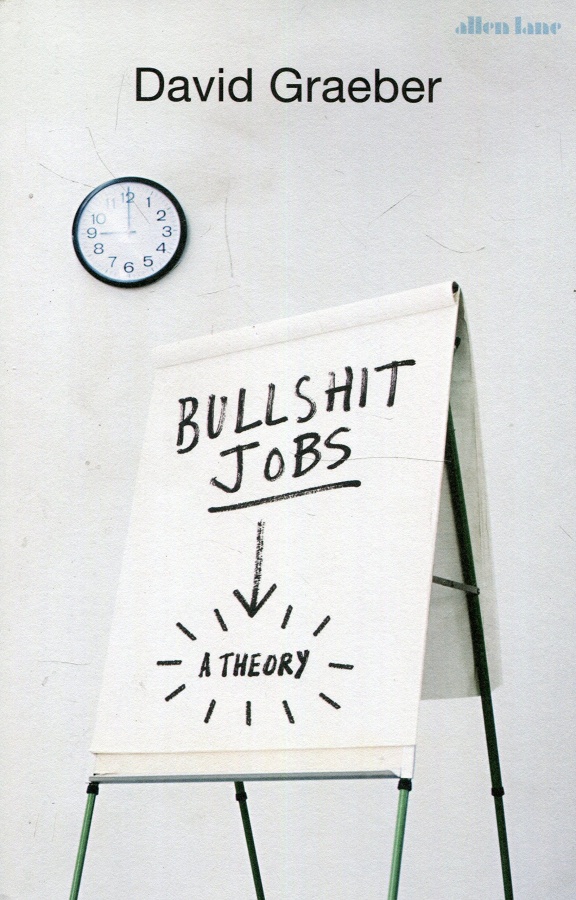Don't Judge People For Slacking Off―They May Just Have a Bullshit Job

In our society, we've been conditioned to believe that jobs are always good. Having a job is always better than not having one, regardless of how grueling, dangerous, or downright useless that job may be. This idea is so pervasive that it even transcends political divides—jobs are just as highly valued in capitalist America as they were in the Soviet Union.
However, when you look into that idea at the individual level, you start to notice some cracks. A sizable percentage of the population thinks their job is bullshit: That the world would be just as well off—if not better—should their job not exist at all.
There must be a disconnect somewhere. How can it be so universally accepted that jobs are morally good when so many people are miserable at work? To find out, I called up Dr. David Graeber, the anthropology professor at the London School of Economics who shone a spotlight on this problem in his viral article, On the Phenomenon of Bullshit Jobs: A Work Rant. We discussed what bullshit jobs are, where they came from, what they do to us, and whether anything can be done about them.
The subtle distinction between shit and bullshit


Shit jobs are low-paid, with miserable conditions and no respect. But the interesting thing is, most of them are quite useful. In fact, there's a general pattern within our society that the more obviously your work benefits other people, the less they pay you. In other words, there seems to be an inverse relationship between compensation and social benefit.
That way of thinking is deeply perverse. Yet people don't just put up with it—they defend this arrangement. They believe that because the work provides a social benefit, it makes the job more rewarding, therefore deserving less compensation. Virtue should be its own reward.
We're seeing this now during the pandemic. We assume the people with essential jobs are going to risk their lives to do things like bring us our Amazon packages. These essential workers are doing something heroic. They deserve our respect not just during the pandemic, but all the time.


This approach has yielded some interesting results. People aren't necessarily dissatisfied in the areas you would anticipate. You'd think it would be a lot of retail workers wondering why they're selling unnecessary products—but you don't get that! People don't sit in judgment of the consumer tastes of others, unless they think they're actively involved in scamming people. You don't get people selling lattes thinking, "This is stupid, why does this person need a latte?" They believe their job provides people with something they want, so it provides a social benefit.
Where you get huge numbers of self-reported bullshit jobs is in areas like administration and management. People saying, "I don't really do anything. I'm here to make sure others do their job, but I used to have their job. I know perfectly well that if I weren't there, they would be behaving exactly the same way."
Sometimes it's even worse: These people feel like they get in the way. To justify their existence to someone upstairs, they make employees fill out endless paperwork. You get this paradox where people perform worse because they spend all their time filling out performance evaluation forms.

Dr. David Graeber is a professor of anthropology at the London School of Economics. His many specializations include social movements, social theory, money, theories of value, debt, class, and politics. In 2013 he wrote an article entitled On the Phenomenon of Bullshit Jobs: A Work Rant, which later became the basis for his 2018 book, Bullshit Jobs: A Theory. Professor Graeber has also written highly-acclaimed books on the topics of debt, democracy, and the theory of value, among others. He holds a PhD in anthropology from the University of Chicago.

I remember this one special effects guy who told me, "When I do special effects for movies, like big dinosaurs attacking spaceships, it's great! That's what gives my life meaning. But 95% of what I do is touching up celebrities to make them look better, or touching up ads to make products look like they work. I'm contributing to making people feel insecure, then selling them products that don't actually work."
The bullshit jobs sector


The first poll I saw showed 37% of respondents thought their job wasn't making a meaningful contribution to anyone. Since then other polls have come out, and I'd put my estimate around 20-25%.


What has increased exponentially is the clerical, administrative and supervisory jobs. That's what I would consider the bullshit job sector.


The thing is, executives are only lean and mean toward people with shit jobs: those who are actually making or moving goods. However, as soon as they have extra money, they pour it into hiring flunkies to make themselves look more important. And there are several reasons for that.
One is political. Both the left and the right totally agree that more jobs is always good. When you have leftwing protesters marching down the street chanting "Money for jobs, not war," you're bound to have rightwing guys looking at them saying, "Bunch of hippies, get a job!" Everybody wants people in jobs.
Then there is the moral element. This idea that unless you're working hard to do something you don't enjoy, preferably under the direction of someone you don't like, then you're a bad person, undeserving of the love, help and care of your community.
Jobs have become a token of moral citizenship. You're not an economic moral citizen unless you have a job. It's the flip side of consumerism: Our work is supposed to be painful in order to win the moral right to enjoy our consumer pleasures.
The doctrine of managerial feudalism


There are two ways that the government can create jobs. One is to stimulate aggregate demand: Give money to ordinary people and they will buy more consumer products.
The other is trickle-down economics; this idea that rich people are job creators, so we should give them money directly and leave it up to them to create jobs. The trouble with this second approach is that if you don't stimulate aggregate demand, nobody has money to buy products, so the wealthy are not going to invest money making products that nobody will buy.
Instead, they'll hire people to create an in-house magazine to talk about how great their company is. They'll employ a bunch of people to boost their image and prestige.


If you ask people in Hollywood why most movies are so bad now, they'll say, "Because 25 people interfere with the script until it no longer makes sense." Instead of just a director and producer, you have these endless ranks of executive vice-presidents who have to find something to do, so they fiddle with the script.


Trouble is, they don't give those assistants anything to do. So they make up things for teachers like me to do. I can't do my research until I've filled out a time allocation survey and analyzed differential learning outcomes for graduates and undergraduates. Who cares! Nobody is going to read the report anyway.
As a result, people spend more and more of their time discussing, predicting, analyzing, assessing what they do, and less and less time actually doing it.

The absurdity of time ownership


This conception of time is where makework comes from. I grew up in a working-class background, painting houses and whatnot. Working class people know what has to be done and take pride in their work. The worst part of their job is when they finish but have to look busy anyway, because their employer says, "You're still on my time."
When I wrote this book, I realized it was strange for someone from a working class background to feel sorry for middle class people getting paid to do nothing. But I do feel their pain, because the worst part of any real job is their entire job. That's all they do, all the time! It must be horrible.
Bullshit destroys the human spirit


It's an interesting reflection on human nature. Economics has sold us a completely false conception of what humans are really about. We're told people want to minimize effort and maximize benefit. By that logic, if you're given $80,000 to just sit there and do nothing, your reaction should be, "Jackpot!" But what we see in most people is the polar opposite.


There are people who do manage to turn bullshit jobs into something greater. Traditionally, poets used to take jobs like night watchman, because nobody bothers you. But most bullshit jobs aren't organized in such a way. You have to look busy. In fact, sometimes those with the least work will look the busiest. This goes back to showing that you're busy and your work is hard in order to earn moral citizenship.
One of things that's quite interesting sociologically—even though I only had a sample of a few hundred interviews—is that I would always ask, "Does your supervisor know you're not actually doing anything all day?" People would say, "I assume they must know, but there's a taboo when it comes to talking about it." Kind of like talking about sex with your parents.
Misplaced judgment will kill us all


The first guys won. People who didn't know what to do with themselves projected their fears on everybody else and there was a panic. In the late 60s, people were worried that the entire working class was going to turn into hippies. To this day, every time technology takes a step forward, you have a moralistic reaction where people say, "Oh no, how will we possibly live when the robots take all the jobs?"
To me, this is the sign of the complete bankruptcy of our economic system. Our ancestors worked hard so that we wouldn't have to. They dreamed of an easier life for us. Instead of reaching for that life, we have failed to solve what should be the easiest economic problem you could possibly have: What to do with all the abundance.


Then on top of bullshit jobs and batshit construction, you have planned obsolescence. Items manufactured in order to break so that we have to buy new ones. There's no moral ambiguity here—everyone agrees we'd be better off with iPhones that don't break and stockings that don't rip. We're artificially creating demand to fuel the unnecessary production that enables the global work machine.
The global work machine is about to kill us. If we don't stop it, it will definitely kill our children. What's so wrong with us that we can't stop?!


Article written by Alex Steullet. Edited by Ade Lee and Mina Samejima. Main illustration thanks to Dan Takahashi. Photograph courtesy of Melissa Flashman.
SNSシェア


